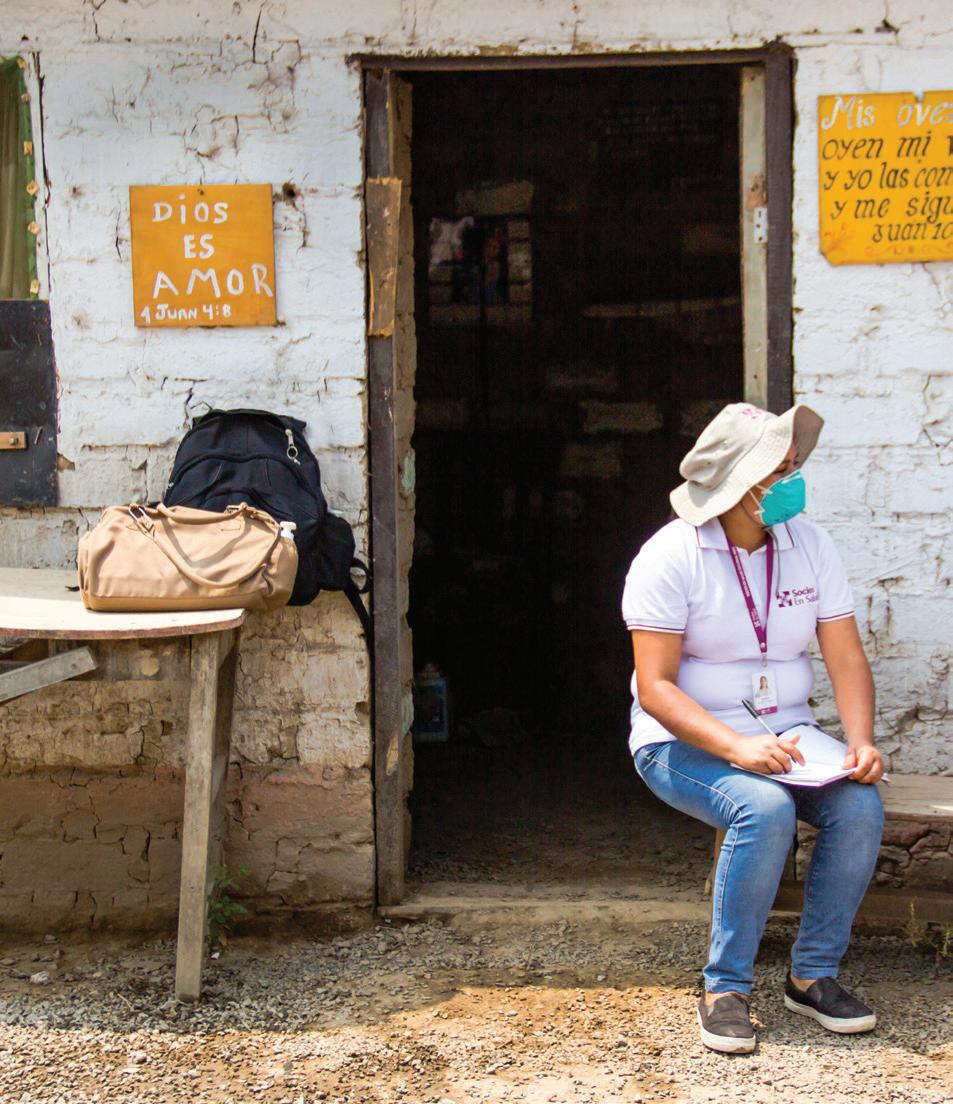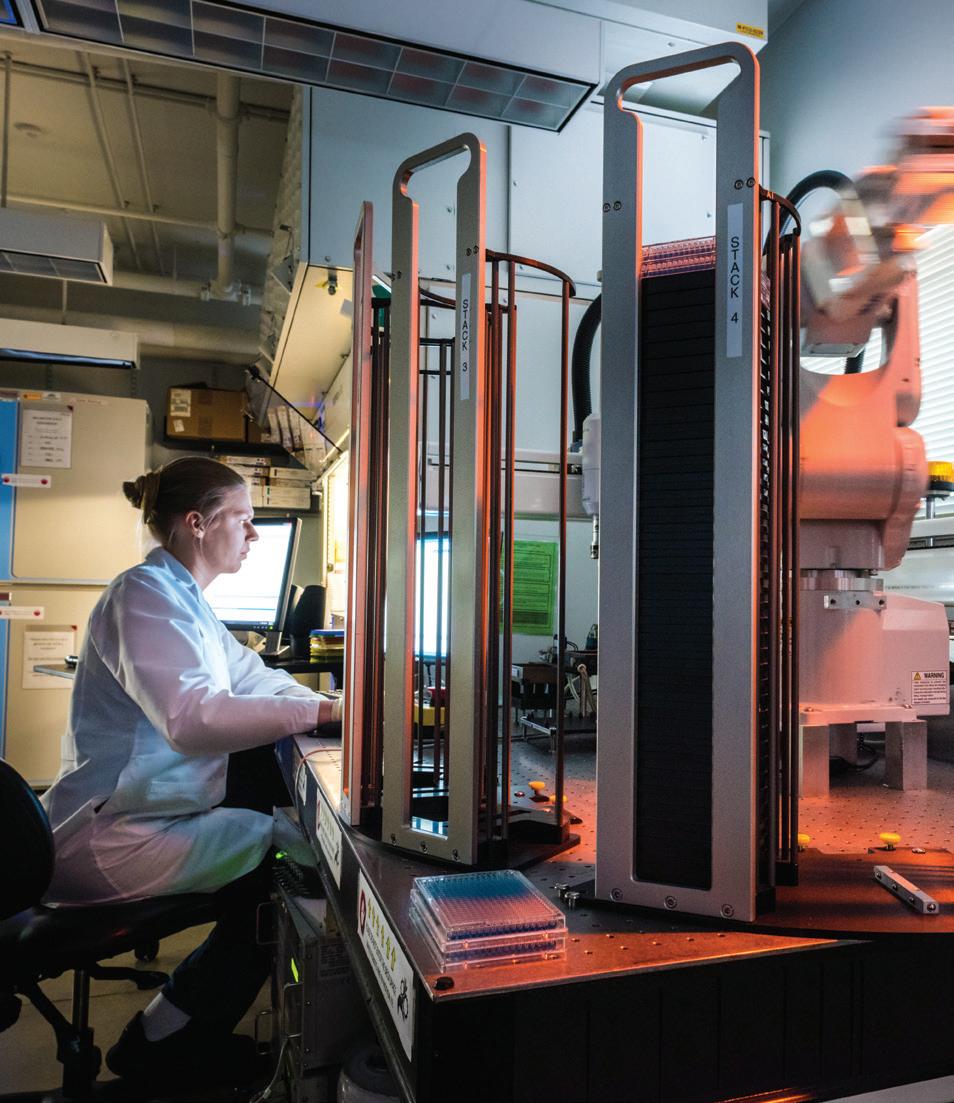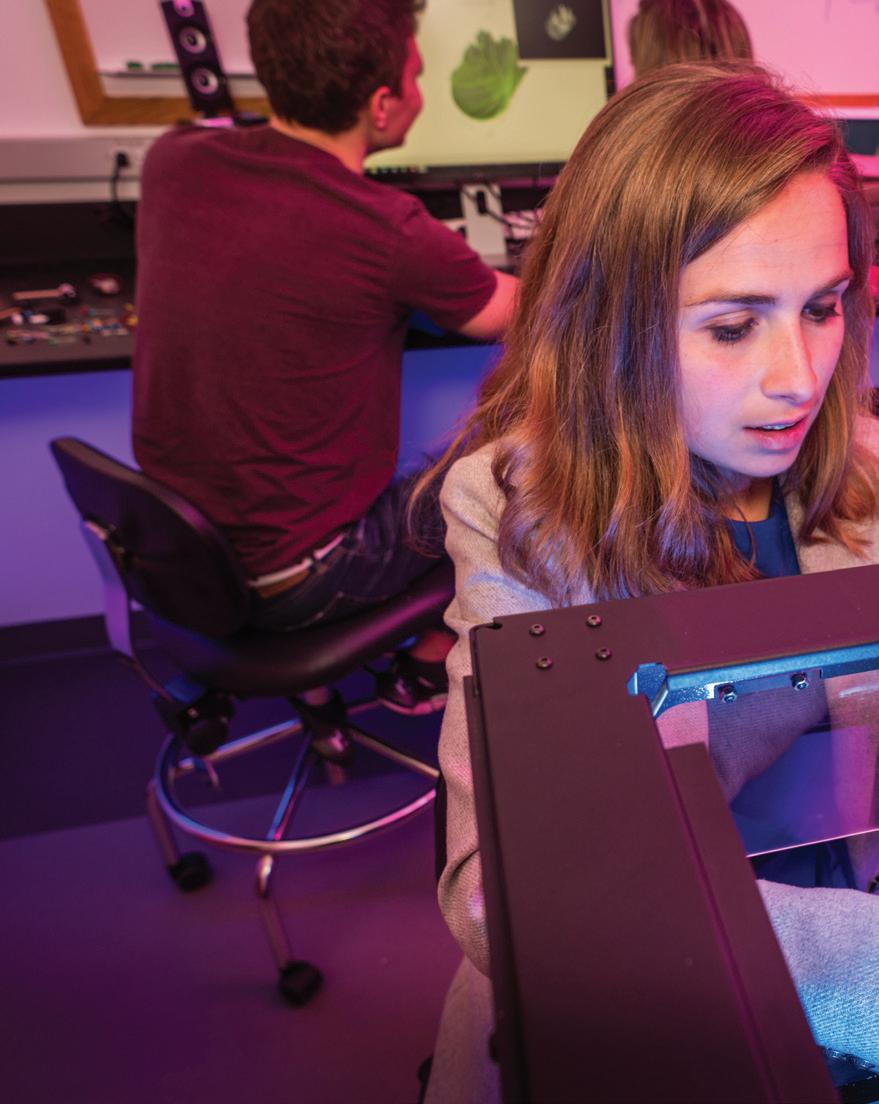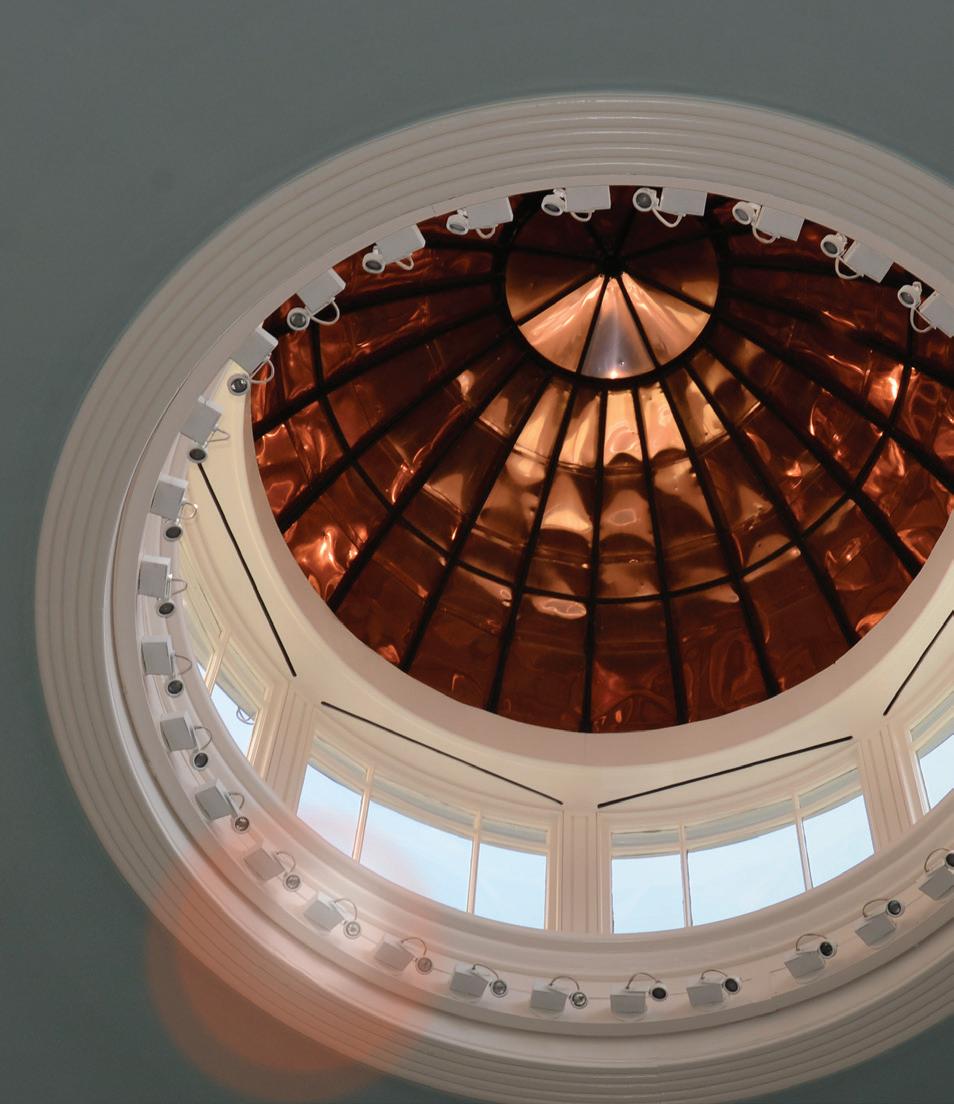
7 minute read
Message from the Dean
On the cover: A Longwood Symphony Orchestra cellist bows his strings during a performance. LSO musicians are primarily health care professionals, many of them doctors, medical students and scientists from HMS and its affiliated hospitals.
Inside cover: During the 2016 Introduction to Patient Clinics, firstyear students hear that they will “learn how to learn medicine at HMS,” because new discoveries will change the field many times during the course of their careers.
Advertisement
Jeffrey S. Flier, HMS Dean, 2007–2016
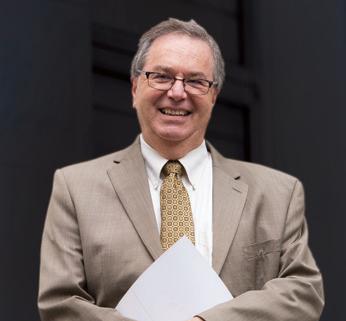
One of the first skills medical students practice is how to listen well. Listening is essential for conducting successful patient interviews and taking histories. It is one of the criteria used to evaluate students on national medical board exams.
Some medical educators have experimented with the use of music as a teaching tool to develop listening skills—a metaphor for verbal communication in medicine. At one school, intricate classical music pieces were deconstructed to help students sharpen concentration and become more engaged listeners. An effective doctor must be able to “hear” a patient’s unspoken cues, such as variations in pitch, rhythm and repetition.
Since 1782, Harvard Medical School physicians and scientists have been deciphering and creating what is needed in the present as well as discerning what might be necessary in the future. Remarkable medical advances have been achieved by innovators attuned to the importance of high-quality patient care and skilled at working in harmony for the betterment of human health.
As any conductor can attest, superior listening skills and a dedication to collaboration are required for an orchestra to create complex, beautiful music. This is not unlike the teamwork required of the more than 11,000 HMS faculty on the Quad and at our 15 affiliated teaching hospitals and research institutions. Every year these researchers and clinicians train thousands of students, postdocs and residents, all working in concert to advance discovery, develop therapies and deliver exceptional health care to thousands of patients here and around the world. »

Dean’s Report 2016–2017
HMS excels in educating leaders in medicine and biomedical research, in advancing basic and translational discovery, and in promoting the delivery of exemplary health care. It accomplishes this through its far-reaching education and discovery enterprises and its many training and research partnerships.
When I first became dean, a comprehensive strategic planning process produced a vision for a vital, more cohesive academic community that was well-positioned to advance scholarship and service to human health into the next century.
We wanted to create medical, graduate science and continuing medical education programs that were increasingly collaborative and to ensure that Quad and affiliate research efforts were more closely linked to education.
The priorities we identified included revitalizing our commitment to the HMS educational mission, expanding opportunities in biomedical research, creating a more inclusive community, and furthering strategic investments in tools and technology.
EDUCATIONAL ACHIEVEMENT
In education, we embarked on a sweeping reform of the preclerkship MD curriculum. Hundreds of faculty forged a new pedagogical structure that more effectively fuses basic science with clinical training. The Pathways curriculum moves students into clinics earlier in their training, and evolving teaching models are being supported by advanced technology and tools that have been integrated into reimagined classrooms.
Our Scholars in Medicine requirement engages MD students with faculty through mentored scholarly projects that help students hone sophisticated discovery and critical thinking skills.
Our top-ranked program in graduate science education has expanded to serve master’s and doctoral students whose leadingedge research takes place at the intersection of life science, medicine, global health and health policy.
We established a new academic Department of Biomedical Informatics to train future scientists in the acquisition and interpretation of big data and to develop more powerful tools for data capture and analysis. We transformed the Division of Medical Ethics into the Center for Bioethics and created a new Master of Bioethics program.
Two new hospital-based academic departments in Emergency Medicine and Neurosurgery were created, recognizing each as a distinct specialty within the HMS academic system. Part of the Center for Primary Care, the Academic Innovations Collaborative was launched five years ago with a major philanthropic gift and is spurring new models of education and care delivery at affiliated primary care teaching practices.
The consolidation of the School’s global, executive, online, consumer and continuing medical education programs within the new Office for External Education has allowed HMS to provide advanced learning oppor
Jeffrey S. Flier, dean of HMS from 2007–2016, leads a round of applause for graduates in front of Gordon Hall on Class Day 2016.
tunities to new cohorts of learners around the world by implementing exciting new residential, online and blended initiatives.
RESEARCH AND DISCOVERY
Within the HMS biomedical research enterprise, remarkable discoveries occur nearly every day. Our scientists’ work is yielding insights into the mechanics of the DNA damage response and has allowed us to glean a better understanding of neurologic disorders such as autism, ALS and Alzheimer’s. New findings have given us clues to the causes of schizophrenia and helped us develop a better understanding of the origins of human beings.
As of this year, 151 current faculty are elected members of the National Academy of Medicine, 69 belong to the National Academy of Sciences and 34 are Howard Hughes Medical Institute investigators.
Over the past nine years, HMS has recruited 40 new faculty to the Quad’s basic and social science departments and named five outstanding new Quad chairs.
The Department of Global Health and Social Medicine was renamed to reflect expanded areas of focus and an exciting new vision. The Department of Health Care Policy advanced its work through the recruitment of new faculty and the development of new programs, while the Department of Microbiology and Immunobiology emerged from the union of Pathology with Microbiology and Molecular Genetics.
Dean’s Report 2015–2016

A new Laboratory of Systems Pharmacology has become the cornerstone of the Harvard Program in Therapeutic Science, which brings bioscientists, software engineers and physicians together to advance the science of drug discovery.
Harvard Catalyst | The Harvard Clinical and Translational Science Center was created and awarded two successive five-year federal grants. It continues to convene, connect and catalyze investigators throughout Harvard and across the U.S. with the resources, tools and training needed to conduct clinical and translational research.
The Ludwig Center at Harvard, which conducts cancer research, was re-envisioned, and HMS was chosen to be the coordinating center for the nation’s Undiagnosed Diseases Network. HMS also initiated several transinstitutional collaborations with the Broad Institute of Harvard and MIT; Harvard Department of Stem Cell and Regenerative Biology; the Ragon Institute of MGH, MIT and Harvard; and the Wyss Institute for Biologically Inspired Engineering.
SERVICE
Because disease knows no borders, HMS has continued its decades-long effort to help protect and advance human health at home and abroad, whether by training physicians in Africa or in the Emirate of Dubai. We have also instructed research clinicians in Portugal and taught medical students in Thailand.
We are working to prevent and treat AIDS, tuberculosis, cholera and malaria in countries such as Haiti and Peru, and we have searched for antifungal agents in Brazil. When the Ebola epidemic erupted in West Africa, HMS faculty evaluated and planned responses. The School also has taken a leadership role in a global surgery initiative. HMS health care policy experts continue to evaluate the effectiveness and efficiency of health care systems, with their findings informing our national debate. This year, the U.S. Surgeon General looked to HMS to promote physician awareness and training related to the nation’s opioid epidemic.
HMS students and faculty deliver medical care through initiatives such as the Crimson Care Collaborative. The School also provides education and research opportunities to students underrepresented in medicine through a wide range of educational outreach programs, fellowships, research opportunities and symposia.
LEADERSHIP
The outstanding achievements of HMS faculty stem directly from their commitment to the School’s mission. Easing the path to recognition of their scholarship and contributions, the School has streamlined the promotions process and clarified criteria on advancement, eligibility rules and appointment titles.
HMS has also made significant strides in recruitment and retention by creating best practices for identifying exceptional junior and senior faculty, particularly women and other groups traditionally underrepresented in medicine, and by strengthening mentoring requirements for junior faculty.
There have been financial challenges and difficult choices during the past two decades, but astute financial sustainability efforts have resulted in reduced costs, better resource management, adjusted financial models, recalibrated hospital financial contributions and new revenue streams.
The grassroots Community Values Initiative is preserving a vision of citizenship in the HMS community, while the generosity of philanthropists and partners has resulted in The World Is Waiting: The Campaign for Harvard Medicine raising more than $584 million, 78 percent of its $750 million goal, as of June 30, 2016.
CONCLUSION
In any symphony, each movement comes to a close at a point designated musically with a coda. HMS has reached another historical coda as it transitions to new leadership. It has been my greatest honor to serve this superb institution and all the individuals who drive its extraordinary record of achievement. I am proud to share here some of the highlights of their work and to express my sincere appreciation for the exceptional dedication that continues to fulfill the noble mission of this School. n

